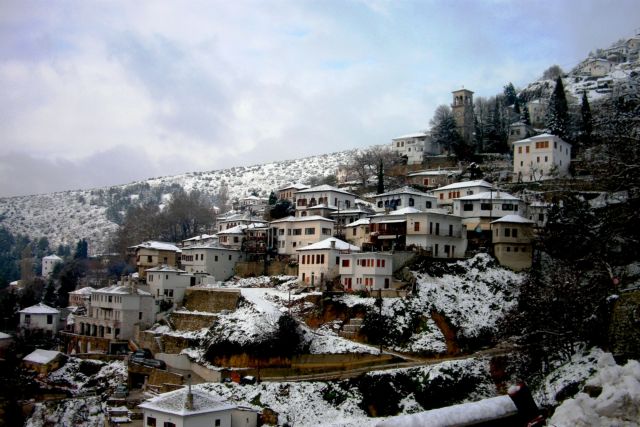
The Greece of today is not the same as the Greece of the 1960s, or even as it was in 1981, when it joined the European community. Over the years, within the European environment, its image has improved at all levels.
In the mountainous regions of the country, however, many fronts remain open, with the problems having intensified after the ten-year recession, as well as the energy crisis with the inflationary pressures it exerts on the economy.
Population reduction
Thus, in the country’s “last days”, Greece still sees negative performances. Statistics show that mountain areas are becoming deserted as local people leave them (there is a three-fold decrease in their population compared to the rest of the country), with what this implies for the primary sector.
Already last May, after a meeting in chaired by Prime Minister Kyriakos Mitsotakis with mayors of the network of mountainous municipalities, an inter-ministerial committee headed by Minister of State Akis Skertsos was formed with the aim of drawing up a “mountainous areas strategic plan”.
The plan, which is almost complete, brings together targeted support policies for a total of 225 mountain local governments, which include 2,158 communities with 750,000 inhabitants, of which 220,000 live permanently in the 38 small mountain municipalities. Which and how many of these policies will finally be implemented will depend on the funds collected from the NSRF, the Public Investment Program, the programs of the CAP (Common Agricultural Policy), “Antonis Tritsis” program and other financial tools.
Actions
The “mountainousness strategic plan” includes actions, financial support and incentives for youth employment, entrepreneurship, the attraction of civil servants, security forces, teachers and health personnel, tourism development, meeting energy needs, etc. Essentially, it is a “toolbox”, from which each municipal authority will be able to choose those that serve it, depending on its needs and readiness.
Labor and Social Affairs
1) Three programs of the Public Employment Service: The first concerns the creation of a program for the employment of young scientists, 500 positions, for two (+1) years, co-financed by the municipalities, based on locality. Priority will be given to nine specialties (social workers, psychologists, agronomists, informatics, trainers, occupational therapists, nurses, language teachers and mathematicians) for the staffing of social services, Community Centers, social tutoring centers, citizen facilitation centers, etc. The second program is designed in the logic of the “First Ensimo” action and will include subsidizing the remuneration and insurance costs of contractors for local government staffing, while the third program will concern the strengthening of mountain tourism.
2) Insurance incentives. The possibility of subsidizing business insurance contributions for specific activities, important for the preservation of local specificity and tradition, is being considered.
3) Social entrepreneurship: Utilization of the social economy and entrepreneurship especially in the less developed and inaccessible areas of the country to promote local development, removing obstacles in areas such as education, culture, health and job creation.
Ministry of Finance
1) Allowances: In order to attract civil servants, security personnel and health personnel to the rural areas, the possibility of granting an extra monthly allowance and relocation subsidies is being considered. Today, different allowances are provided, e.g. monthly allowance of 100 euros for remote – border areas and for the security forces, 400 euros for doctors on duty in regional clinics and Health Centers in problematic and barren areas, etc.
2) Private debt management: Further development of the electronic debtor support system (myEGDIXlive), which gives remote assistance via video conference or telephone, with the aim of increasing settlements through the out-of-court debt settlement mechanism. The online service portal is planned to soon include debtor support for all platforms of the Special Secretariat for Private Debt Management.
3) Strengthening tourism (probably a parallel action with the Ministry of Tourism). An exemption from accommodation tax is being promoted for both main hotel accommodation and rental rooms and apartments in non-designated tourist areas, including mountain communities.
Ministry of Interior
1) Financial aid to local governments of mountain municipalities: It is proposed to increase the SATA (Collective Decision of Local Government) investment program for mountain municipalities in order to cover the same participation in programs and the provision of technical assistance. Furthermore, it is planned to provide additional funding through the CAP (Common Agricultural Policy) or with a special resource to cover the increased operational costs of mountain municipalities, with funding from fees associated with mountain areas (fees in favor of local governments from Renewable Energy projects, quarries and mining, logging, hunting). It is also being considered to grant special additional funding to school boards in the winter season.
2) Locality in recruitment: A special arrangement for rapid recruitment of temporary staff with locality is promoted.
3) Maturation and implementation of projects: First, it is planned to group similar or related projects and assign their maturation to the Hellenic Republic Asset Development Fund and, secondly, the operation and staffing of development organizations for groups of municipalities with common (mainly geographical) characteristics in order to speed up the development studies and addressing the common challenges faced by local governments.
Ministry of Environment and Energy
1) Just Go Zero: Circular waste management according to the standards of the Tilos program (door-to-door collection of garbage and its full utilization) with the cooperation of the private sector and local governments.
2) Unified project for the management of infrastructure: With the excavations that will be done for the management of urban sewage, water supply and rainwater within the mountain settlements, the needs for undergrounding of electricity transmission networks in squares or settlement centers, fiber optic installations will be covered for data transfer etc. Sub-projects are planned for five settlements in Epirus, seven settlements in Eastern Macedonia, Thrace and Western Macedonia, five settlements in Thessaly, Central Greece and Thermo Aitoloakarnania, six settlements in Peloponnese, Achaia and five settlements in Crete.
3) Removal of energy isolation: Covering 80% of the consumer bill through virtual energy netting (Virtual Net Metering) of the electricity injected into the electrical grid by photovoltaic systems. The required power from photovoltaics to cover energy needs amounts to 142.6 MW (construction cost 100 million euros), saving consumers 37.2 million euros/year. The minimum current absorption margins from the electrical networks is a “thorn”.
Ministry of Education and Religious Affairs
1) School field trips: Examining the possibility of planning school trips in mountainous areas.
2) Possibility of co-service with spouse (or other first-degree relative): It is examined whether it is possible to institutionalize additional incentives.
3) Teacher recruitment management: It is expected that substitutes will be allowed to stay for more years, with automatic activation of contracts every September for three or five years for the same school unit if there are still needs. It is promoted to shorten the time interval between non-acceptance of the recruitment and the realization of recruitments of the next phase of appointments.
4) Teacher leave management: It is recommended for substitutes to declare their preference for areas in the summer, with a simultaneous declaration of intention to take a long-term leave, and for permanent teachers to declare their planned long-term leaves at least two months in advance.
5) Flexible teachers’ hours: The plan includes more flexibility in covering the hours of teachers serving in remote mountainous areas in terms of course assignments as well as the possibility of a small deviation in the completion of teachers’ hours (when there is no nearby school unit), either by assigning administrative work or remedial teaching.
6) Utilization of municipal buildings through PPP: Construction of apartments, through grants, at 40 inactive school units existing in 21 mountain municipalities.
Ministry of Health
1) Operation of Mobile Primary Health Care Teams (PHC): The operation of PHC is foreseen in 9 Health Centers of small mountain municipalities and in 29 Health Centers of neighboring municipalities. The CHMs will offer preventive examinations in remote areas to sensitive groups of the population, such as orthopedic check-ups, general blood tests with an emphasis on sugar, cholesterol, hematocrit and blood pressure measurement. The proposal will be specialized for small mountain communities.
2) Increasing the coverage of the National Telemedicine Network (EDIT): Placement of 305 Doctor-Patient Telemedicine Stations in remote locations and 35 Consultant Physician Telemedicine Stations. Especially for the 38 small mountain municipalities, it has been proposed to install EDIT points in 71 Health Centers, Regional Polyclinics and Regional Clinics.
3) Maintenance and activation of Local Health Units (ToMY): According to the results of the 3rd staff recruitment notice, there was no expression of interest from medical and nursing staff and as a result it is not possible to establish ToMY in the small mountain municipalities. Their creation will be examined in the light of the incentives that will be given for the staffing of public structures.
Ministry of Digital Governance
1) Transition to the digital signal of all mountainous regions of the country.
2) Mobile phone signal coverage for communication needs as well as funding for the installation of emergency telephones on forest roads.
3) Facilitating the award of contracts (joint action with the Ministries of Interior and Development): Digitization of all services for the award of contracts and control procedures on a centralized management basis and with remote administrative support for mountain municipalities. Removal of the limit of 10% of the appropriations budget for the direct assignment of studies.
Ministry of Rural Development and Food
Rural economy infrastructure financing program: It concerns funds for the construction of livestock watering tanks, rural road construction, the electrification of stable facilities and for the technical support program for cooperatives. There is also the possibility of introducing horizontal aid to cover the cost of fertilizers and animal feed.
Latest News

Rhodes Airport Tops Fraport Greece’s Regional Airports in 2024 Performance
According to Fraport's data, more than 35 million passengers (specifically 35.2 million) were handled by Fraport-managed airports during the 11 months.

European Central Bank Cuts Interest Rates by 25 Basis Points
It is the fourth cut of interest rates by Europe’s central bank, a move expected by the markets and financial analysts leading to the rate settling at 3%.

Airbnb: New Measures Add €600 in Extra Costs for Property Owners
Property managers face an immediate administrative fine of 5,000 euros if access to the inspected property is denied or any of the specified requirements are not met.

Economist: Greece Included in the Best Performing Economies in 2024
Meanwhile, Northern European countries disappoint, with sluggish performances from the United Kingdom and Germany.

EasyJet Expands Its Routes from Athens
The airline’s two new routes will be to London Luton and Alicante and they will commence in summer 2025.

Capital Link Forum Highlights Greece’s Economic Resurgence; Honors BoG Gov Stournaras
Capital Link Hellenic Leadership Award recipient, Bank of Greece Gov. Yannis Stournaras, an ex-FinMin, was lauded for his pivotal role during Greece’s economic recovery

Tourist Spending in Greece Up by 14%, Visa Card Analysis Shows
Greece’s capital Athens emerged as the most popular destination, recording a 17% increase in transactions with Visa cards, surpassing even the cosmopolitan island of Mykonos.

Inflation in Greece Unchanged at 2.4% in Nov. 2024
The general consumer price index (CPI) posted a 0.4% decrease in November compared to the previous month

2024 Christmas Holidays: Extended Shop Hours Schedule
The 2024 Christmas Holidays extended shop hours schedule commences on Thursday, December 12 and runs until the end of the year.

ELSTAT: Seasonally Adjusted Unemployment Down in October
The number of employed individuals reached 4,284,694, an increase of 67,723 compared to October 2023 (+1.6%) and 22,002 compared to September 2024 (+0.5%).

![Φυσικό αέριο: Δυναμικό come back του LNG στην Ελλάδα [γραφήματα]](https://www.ot.gr/wp-content/uploads/2023/01/OT_naturalgas-90x90.jpeg)












![Fraport: Πάνω από 35 εκατ. επιβάτες στα αεροδρόμια το 11μηνο – Πτώση στη Μύκονο [πίνακας]](https://www.ot.gr/wp-content/uploads/2022/06/fraport-90x90.jpg)


















![Φυσικό αέριο: Δυναμικό come back του LNG στην Ελλάδα [γραφήματα]](https://www.ot.gr/wp-content/uploads/2023/01/OT_naturalgas-600x474.jpeg)








 Αριθμός Πιστοποίησης Μ.Η.Τ.232433
Αριθμός Πιστοποίησης Μ.Η.Τ.232433